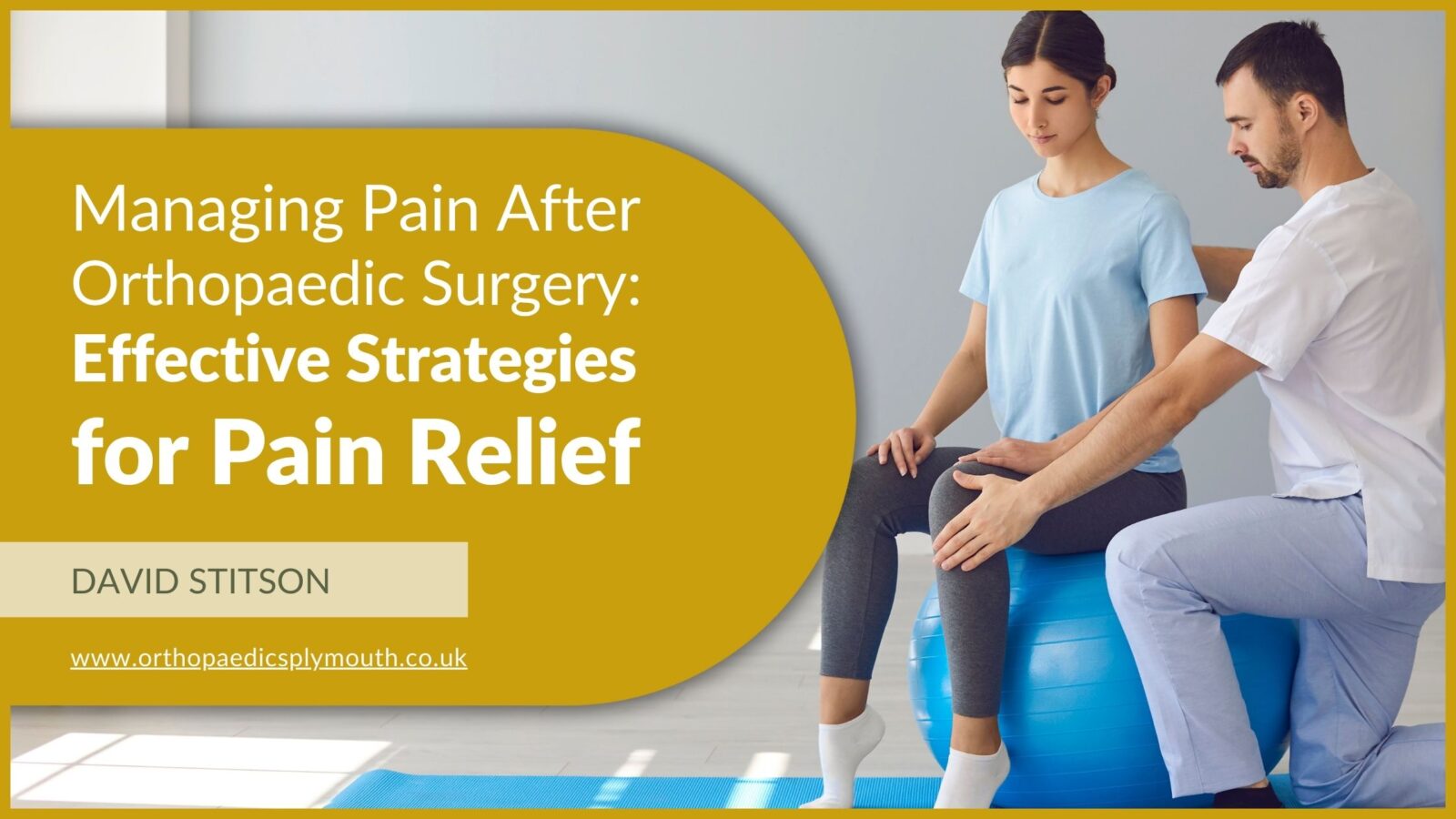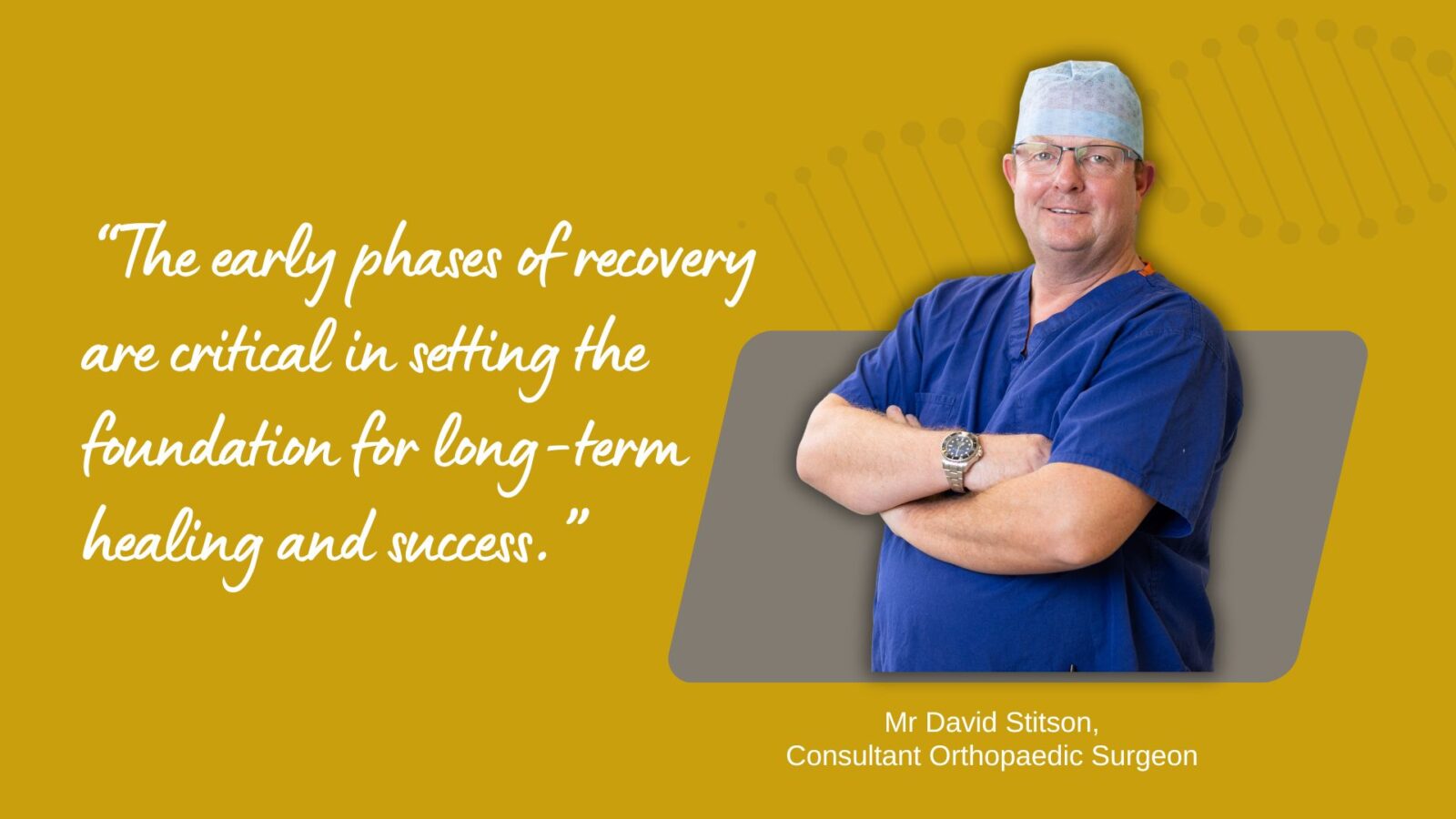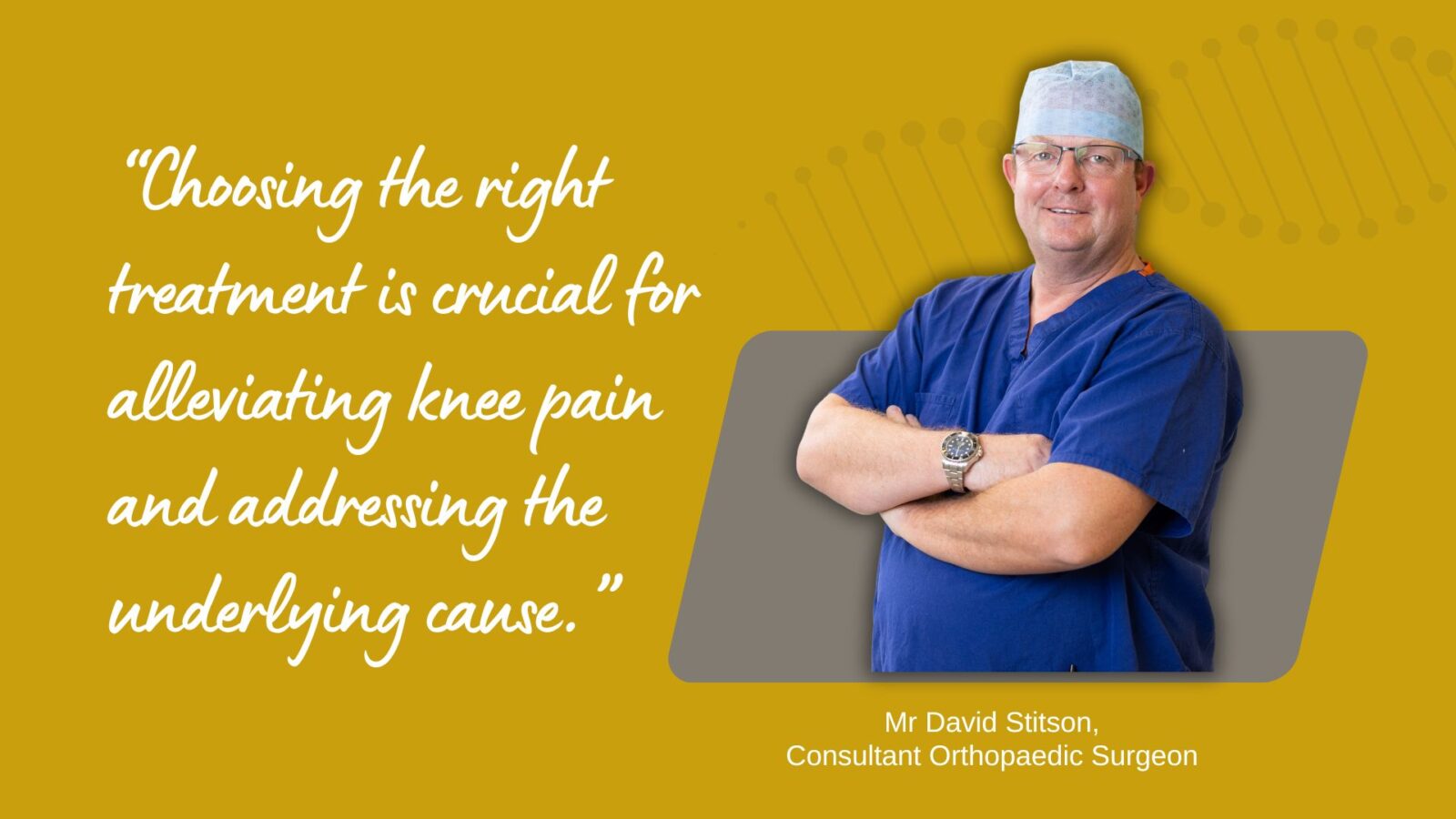How to Successfully Manage Pain After Orthopaedic Surgery
Managing pain after orthopaedic surgery is crucial for ensuring a smooth and successful recovery. It involves a combination of medical treatments and personal care routines. Here are some strategies recommended by Mr Stitson, a highly experienced Consultant Orthopaedic Surgeon in Plymouth:
Contents
Toggle– Medications: Prescribed analgesics such as paracetamol, non-steroidal anti-inflammatory drugs (NSAIDs) and opioids can significantly reduce pain. Always follow the dosage instructions provided by your doctor.
– Physiotherapy: Engaging in guided physiotherapy helps to minimise stiffness and improve mobility, thus reducing discomfort.
– Cold and Heat Therapy: Apply ice packs or warm compresses to the affected area to reduce swelling and alleviate pain.
– Mind-Body Techniques: Practices such as deep breathing, meditation, and relaxation exercises can also help to manage pain perception and improve overall well-being.
By adopting these strategies, patients can better control pain levels and support their body’s healing process.
Understanding Orthopaedic Post-Surgical Pain
Types and Causes of Pain
Orthopaedic surgery often involves intricate procedures on bones, muscles and joints, which can lead to distinct types of post-surgical pain. The pain experienced can broadly be categorised into acute pain, which is immediate and short-term and chronic pain, which persists for an extended period.
Acute pain typically arises from tissue damage during surgery, inflammation and the normal healing process. In some cases, pain can also result from nerve damage or pressure on surrounding structures due to swelling.
Importance of Pain Management
Effective pain management is a crucial component of post-orthopaedic surgery recovery. Managing pain adequately not only improves the patient’s comfort but also accelerates the healing process by enabling early mobilisation and facilitating physiotherapy.
Uncontrolled pain can lead to complications such as increased stress, delayed rehabilitation and even the risk of going on to develop chronic pain. By managing pain effectively, patients are more likely to adhere to their rehabilitation programmes, resulting in better functional outcomes and overall recovery.
Common Challenges in Pain Relief
Despite the importance of pain management, several challenges may arise. One major challenge is the under-reporting of pain by patients due to fear of dependency on pain medication or concerns about side effects. Additionally, there is the complexity of accurately assessing pain levels, as pain perception can vary greatly from one individual to another.
The existence of co-morbid conditions and potential drug interactions can also complicate the choice of appropriate pain management strategies. Mr Stitson will maintain open communication with patients to tailor an effective pain management plan.
Pharmacological Pain Management Strategies
Over-the-Counter Medications
Over-the-counter (OTC) medications are often the first line of defence against post-surgical pain. Non-prescription options such as paracetamol and non-steroidal anti-inflammatory drugs (NSAIDs), like ibuprofen, can provide relief for mild to moderate pain. These medications work by reducing inflammation and interrupting pain signalling pathways. They can be particularly useful when pain is less severe and can be combined with other modalities for enhanced pain relief.
Prescription Pain Relievers
For more intense pain, prescription medications may be required in addition to baseline paracetamol and anti-inflammatory. These include opioids such as morphine, codeine, or oxycodone, which are effective for managing severe pain by binding to receptors in the brain and blocking pain signals.
Mr Stitson may also prescribe nerve pain medications, such as gabapentin, that target neuropathic pain. While effective, these medications demand careful monitoring due to the potential risks of dependence and side effects, making it imperative for patients to follow Mr Stitson’s instructions closely.
Timing and Dosage Considerations
The timing and dosage of pain medication play a critical role in pain management after orthopaedic surgery. Optimal timing ensures that the medication reaches its peak effect when pain levels are expected to be highest. Health professionals often recommend taking pain medication before engaging in activities that may exacerbate pain, such as physiotherapy sessions.
Adhering to prescribed dosages is equally important to maximise pain relief while minimising side effects. Continuous communication between the patient and healthcare provider can help fine-tune the regimen, ensuring effective and safe pain relief throughout the recovery period.
Non-Pharmacological Pain Relief Methods
Following orthopaedic surgery, many patients seek methods to alleviate pain beyond traditional medication. Non-pharmacological pain relief methods can be highly effective and are often complementary to drug therapies, offering patients extra support in their recovery journey. Be aware, however, that interactions can still occur when used in conjunction with conventional medications.
Physiotherapy and Exercise
Physiotherapy is an integral component of post-operative care. Engaging in a tailored exercise programme aids in strengthening muscles, enhancing flexibility and reducing pain. A physiotherapist can design exercises that support healing without overburdening the body. These exercises stimulate circulation and decrease stiffness, contributing significantly to pain reduction. Consistent physical activity, guided by professionals, assists in gradually restoring functionality to affected areas.
Heat and Cold Therapy
Applying heat or cold therapy can be an immediate and effective way to manage pain and swelling. Cold packs are particularly useful in reducing inflammation and numbing sharp pain during the initial stages of recovery. Heat therapy, such as warm compresses or heated pads, can relax tense muscles and enhance blood flow, aiding in quicker healing during later recovery phases. Patients should consult with Mr Stitson to determine the appropriate application periods for each therapy type.
Mind-Body Techniques
Pain management can benefit greatly from integrating mind-body techniques. Practices such as meditation, deep-breathing exercises and gentle yoga can reduce stress and promote relaxation, which in turn diminishes pain perception. These techniques encourage a focus on calmness and positive mental imagery, equipping patients with stronger mental resilience against discomfort. Additionally, cognitive-behavioural therapy can empower patients by changing their pain perceptions and coping strategies.
Lifestyle Adjustments for Pain Management
Adjustments in daily habits can significantly impact pain levels following orthopaedic surgery, providing a smoother pathway to recovery.
Diet and Nutrition
Consuming a balanced diet rich in anti-inflammatory foods can aid recovery and minimise pain. Incorporate fruits, vegetables, lean proteins and omega-3 fatty acids from sources such as fish and nuts. These nutrients support tissue repair and reduce inflammation. Staying hydrated is equally crucial, as dehydration can increase muscle tension and pain.
Sleep and Rest
Adequate sleep is a cornerstone of effective pain management. Quality rest helps the body repair itself and reduces pain sensitivity. Establish a peaceful sleep environment by maintaining a regular sleep schedule and limiting exposure to screens before bedtime. Daytime rest is also important; listen to your body and ensure it has the necessary downtime to recuperate.
Stress Reduction Techniques
Stress can amplify pain, making stress reduction an essential part of recovery. Techniques such as mindfulness practice, engaging in hobbies and social activities can provide emotional relief and resilience. Spending time with loved ones or seeking support groups can offer emotional comfort, leading to an overall enhancement in well-being and reduced pain perception.
4 Effective Pain Management Strategies
Pain management following orthopaedic surgery is a crucial aspect of ensuring a smooth and successful recovery. Addressing pain effectively can significantly enhance a patient’s comfort and overall healing experience. Consider the following strategies to optimise pain control post-surgery:
1 – Medication Management:
Prescribed pain medications, such as paracetamol, non-steroidal anti-inflammatory drugs (NSAIDs) and opioids, play a pivotal role in postoperative pain relief. It is imperative to follow the healthcare provider’s instructions meticulously to prevent side effects or dependency. Discuss any concerns or potential side effects with Mr Stitson.
2 – Physiotherapy and Movement:
Engaging in prescribed physiotherapy can greatly assist in managing pain. Gentle movements and exercises relieve stiffness and can enhance the body’s healing processes. Always adhere to the guidance of your physiotherapist to avoid overexertion.
3 – Cold and Heat Therapy:
Implementing cold packs initially post-surgery can reduce swelling and numb the pain. As healing progresses, heat therapy may be introduced to soothe sore muscles and increase circulation.
4 – Mindfulness and Relaxation Techniques:
Practices such as meditation, deep breathing exercises and progressive muscle relaxation can be effective in alleviating pain. These techniques aid in shifting focus away from pain and reducing stress, which may otherwise exacerbate discomfort.
Implementing a comprehensive pain management plan tailored to your individual needs, under professional guidance, is vital in navigating your recovery journey successfully.
It is essential to discuss all your options with Mr Stitson, who can guide you through the treatment process and advise on how you can achieve the best possible outcome.
FAQs for Successfully Managing Pain After Orthopaedic Surgery
Q: How long will pain last after orthopaedic surgery?
A: The duration of pain after orthopaedic surgery varies based on the specific procedure and individual factors. Generally, acute pain can last from a few days to several weeks. It is essential to follow your healthcare provider’s instructions for pain management to facilitate a quicker recovery.
Q: Can I use over-the-counter medications for pain relief?
A: Over-the-counter medications, like paracetamol and ibuprofen, can be effective for mild to moderate pain relief following surgery. However, it is crucial to consult Mr Stitson before using them to ensure they do not interfere with your specific treatment plan or any other prescribed medications.
Q: Are there non-medical methods to manage orthopaedic pain?
A: Yes, non-medical approaches such as physiotherapy, ice packs and adequate rest can significantly contribute to pain management. Additionally, practices such as meditation or controlled breathing might provide comfort and help to alleviate discomfort.
Q: When should I contact a healthcare professional about my pain?
A: It is important to reach out to your healthcare provider if your pain persists beyond a reasonable period or worsens or if you experience symptoms like fever, redness or swelling. These could indicate complications that require professional attention.
Implementing a comprehensive pain management strategy post-surgery can greatly enhance your recovery experience, helping you to regain mobility and return to daily activities with improved wellness.
About Hip Surgery
Hip replacement surgery replaces the worn-out, painful and stiff hip joint with a new prosthetic joint. This procedure is normally performed under spinal anaesthesia and is commonly followed by a night or two in the hospital. Day-case hip replacement surgery may be an appropriate option for you.
About Knee Surgery
Knee replacement surgery replaces the worn out, painful and stiff knee joint with a new prosthetic joint. This procedure which may be a partial or a total replacement is normally performed under spinal anaesthesia and is usually followed by a night or two in the hospital. Day-case knee replacement surgery may be an appropriate option for you.

About Mr Stitson
David Stitson is a Plymouth-based Consultant Trauma and Orthopaedic Surgeon. Trained both in the UK and internationally, he has worked in medicine for more than 20 years for the NHS, for the Royal Air Force and in private practice. Mr Stitson operates privately at the Nuffield Health Hospital, Plymouth.

The Nuffield Plymouth CQC Rating
The Nuffield Hospital has a history that spans over half a century and has built a reputation for high standards of care, professionalism and expertise in delivering health services. They aim for continuous quality improvement in everything they do.
Active Quality and Governance programmes are in place at the Nuffield Hospital Plymouth. As part of this, the hospital is inspected by independent healthcare regulators to ensure it meets the fundamental standards of quality and safety as determined by the regulating body (CQC).
In the most recent inspection, Plymouth Nuffield Hospital was rated as ‘Good’ overall, however, the surgical element of the inspection was rated as ‘Outstanding’. The hospital was referred to as:
“Outstanding in effective and caring, and
Good in safe, responsive and well-led.”







